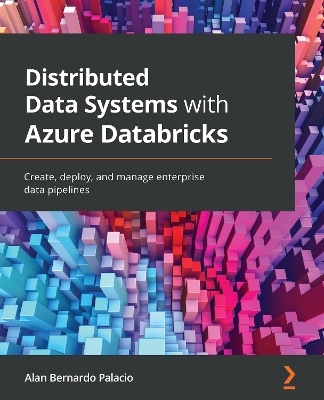
Distributed Data Systems with Azure Databricks
Packt Publishing Limited (Verlag)
978-1-83864-721-6 (ISBN)
Quickly build and deploy massive data pipelines and improve productivity using Azure Databricks
Key Features
Get to grips with the distributed training and deployment of machine learning and deep learning models
Learn how ETLs are integrated with Azure Data Factory and Delta Lake
Explore deep learning and machine learning models in a distributed computing infrastructure
Book DescriptionMicrosoft Azure Databricks helps you to harness the power of distributed computing and apply it to create robust data pipelines, along with training and deploying machine learning and deep learning models. Databricks' advanced features enable developers to process, transform, and explore data. Distributed Data Systems with Azure Databricks will help you to put your knowledge of Databricks to work to create big data pipelines.
The book provides a hands-on approach to implementing Azure Databricks and its associated methodologies that will make you productive in no time. Complete with detailed explanations of essential concepts, practical examples, and self-assessment questions, you’ll begin with a quick introduction to Databricks core functionalities, before performing distributed model training and inference using TensorFlow and Spark MLlib. As you advance, you’ll explore MLflow Model Serving on Azure Databricks and implement distributed training pipelines using HorovodRunner in Databricks.
Finally, you’ll discover how to transform, use, and obtain insights from massive amounts of data to train predictive models and create entire fully working data pipelines. By the end of this MS Azure book, you’ll have gained a solid understanding of how to work with Databricks to create and manage an entire big data pipeline.
What you will learn
Create ETLs for big data in Azure Databricks
Train, manage, and deploy machine learning and deep learning models
Integrate Databricks with Azure Data Factory for extract, transform, load (ETL) pipeline creation
Discover how to use Horovod for distributed deep learning
Find out how to use Delta Engine to query and process data from Delta Lake
Understand how to use Data Factory in combination with Databricks
Use Structured Streaming in a production-like environment
Who this book is forThis book is for software engineers, machine learning engineers, data scientists, and data engineers who are new to Azure Databricks and want to build high-quality data pipelines without worrying about infrastructure. Knowledge of Azure Databricks basics is required to learn the concepts covered in this book more effectively. A basic understanding of machine learning concepts and beginner-level Python programming knowledge is also recommended.
Alan Bernardo Palacio is a Data Scientist and Engineer with vast experience in different engineering fields. His focus has been the development and application of state-of-the-art data products and algorithms in several industries. He has worked for companies such as Ernst and Young, Globant, and now holds a Data Engineer position at Ebiquity Media helping the company to create a scalable data pipeline. Alan graduated with a Mechanical Engineering degree from the National University of Tucuman in 2015, participated as the founder in startups, and later on earned a Master's degree from the faculty of Mathematics in the Autonomous University of Barcelona in 2017. Originally from Argentina, he now works and resides in the Netherlands.
Table of Contents
Introduction to Azure Databricks core concepts
Creating an Azure Databricks workspace
Creating an ETL with Databricks
Delta Lake with Databricks
Introducing Delta Engine
Structured Streaming
Azure Databricks integration with Popular Python Libraries
Databricks Runtime for Machine Learning
Databricks Runtime for Deep Learning
Model tuning, deployment and control Using DataBricks AutoML
MLFlow on Azure Databricks
Distributed Deep Learning with Horovod
| Erscheinungsdatum | 28.05.2021 |
|---|---|
| Verlagsort | Birmingham |
| Sprache | englisch |
| Maße | 75 x 93 mm |
| Themenwelt | Informatik ► Datenbanken ► Data Warehouse / Data Mining |
| Mathematik / Informatik ► Informatik ► Netzwerke | |
| ISBN-10 | 1-83864-721-X / 183864721X |
| ISBN-13 | 978-1-83864-721-6 / 9781838647216 |
| Zustand | Neuware |
| Haben Sie eine Frage zum Produkt? |
aus dem Bereich


